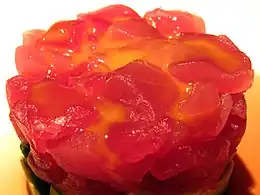Dotter
German

Wachteldotter
Pronunciation
- IPA(key): /ˈdɔtɐ/
Audio (file)
Etymology 1
From Middle High German toter, tuter, from Old High German totoro, tutaro, from Proto-West Germanic *dodrō. The modern form with initial d- and internal -tt- is of dialectal, probably Bavarian, origin.
Usage notes
- Dotter is used most often to describe lifeforms. It can also be culinary, but for that Eigelb is more common.
- The neuter gender is used less and sometimes deemed colloquial.
Declension
Declension of Dotter [masculine // neuter, strong]

Etymology 2
From Middle High German toter, tother, from Old High German totir, from Proto-West Germanic *dodr.
Noun
Declension
This article is issued from Wiktionary. The text is licensed under Creative Commons - Attribution - Sharealike. Additional terms may apply for the media files.